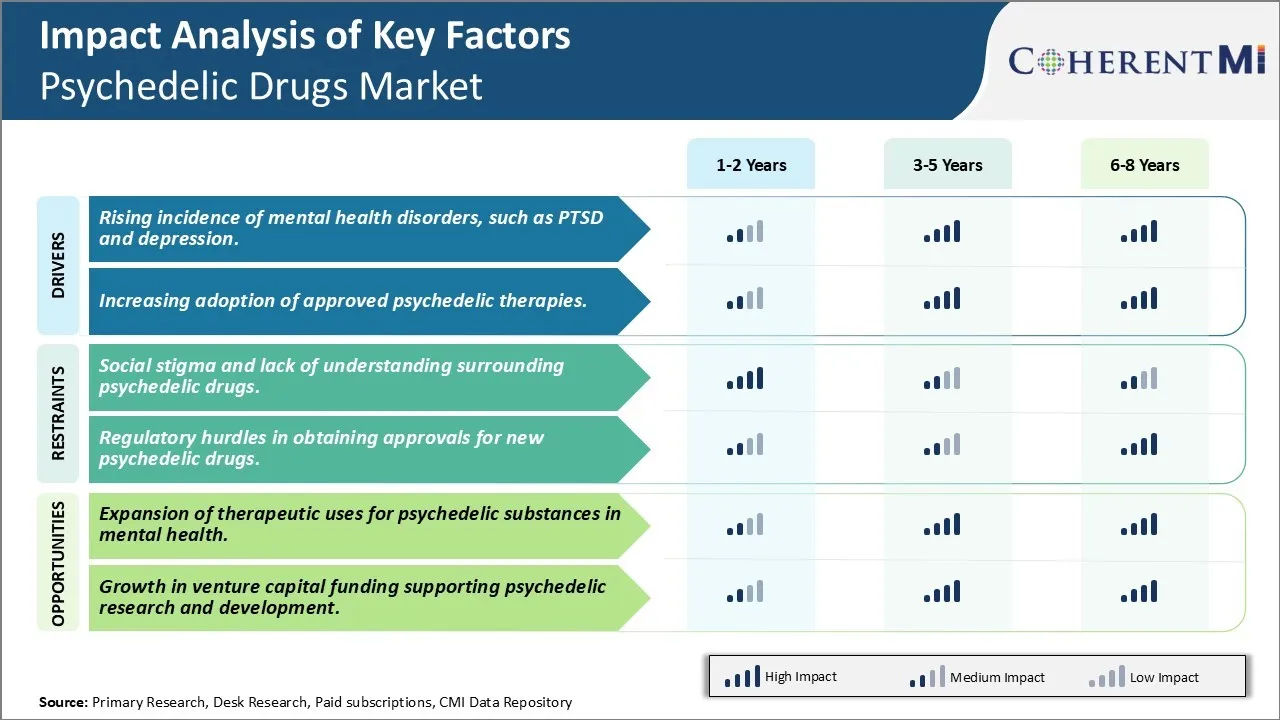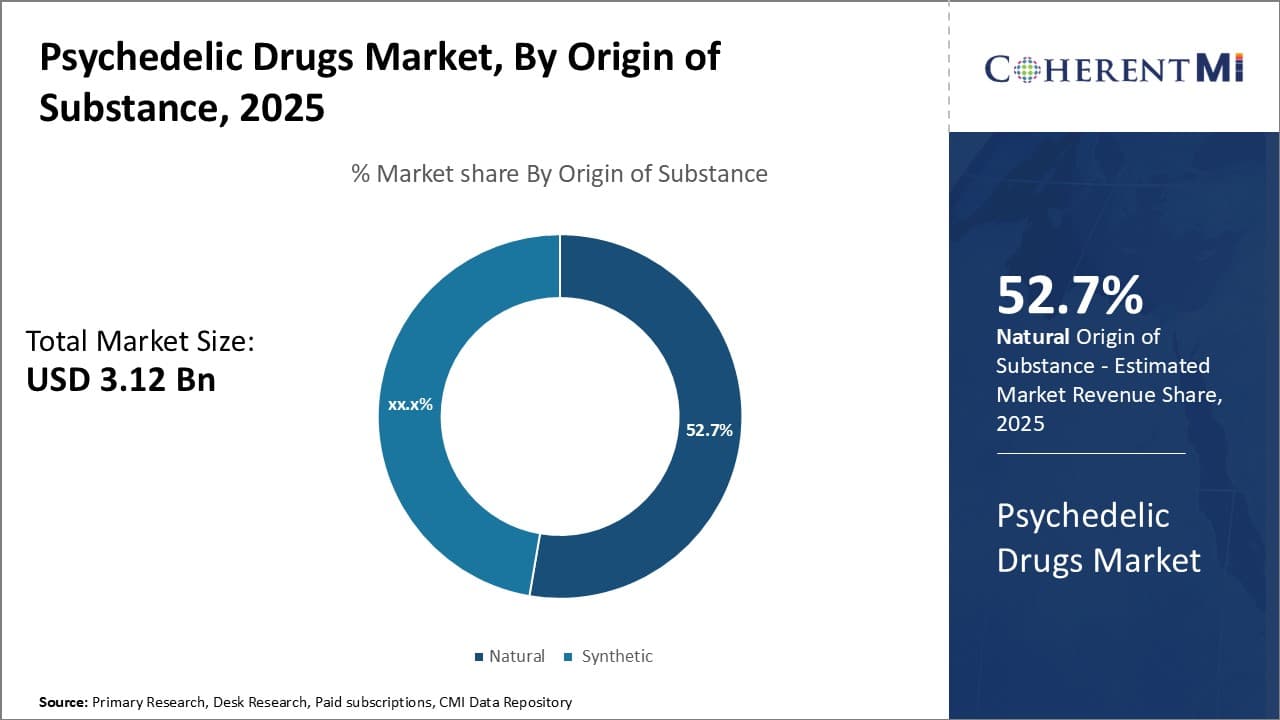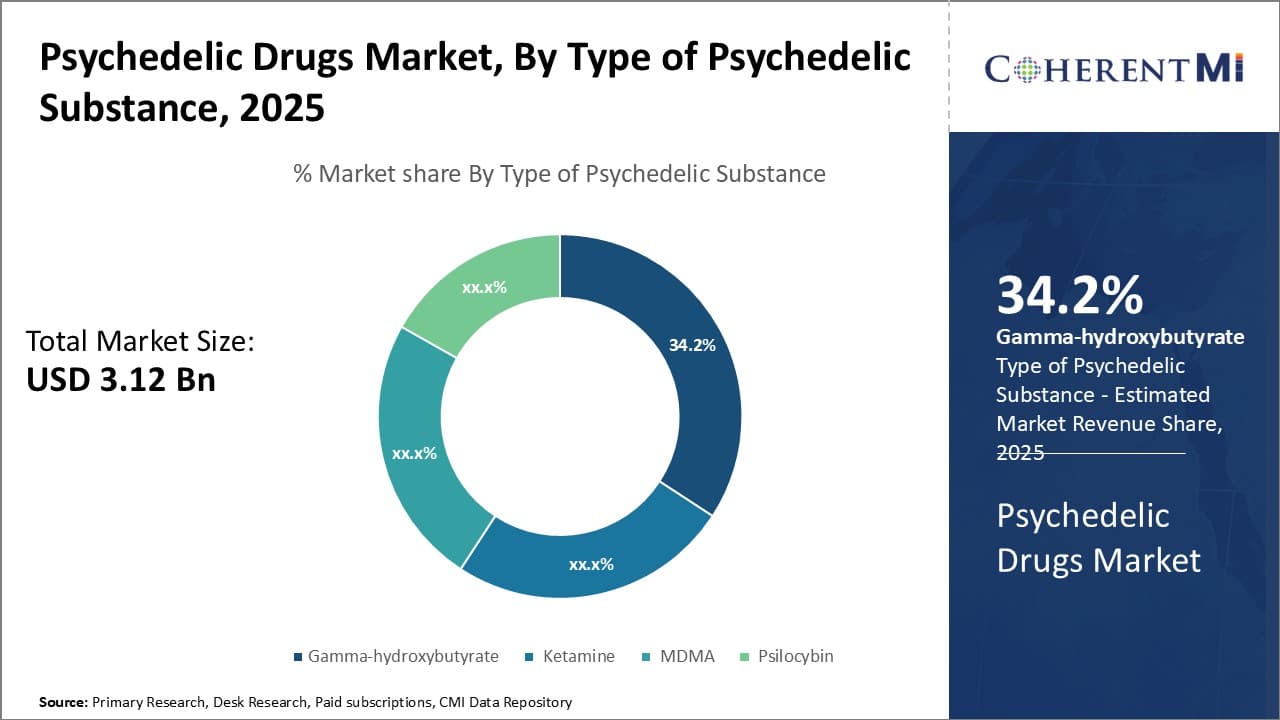

The psychedelic drugs market is estimated to be valued at USD 3.12 Bn in 2025 and is expected to reach USD 8.50 Bn by 2032, growing at a compound annual growth rate (CAGR) of 15.4% from 2025 to 2032. With rising awareness about mental health and increasing research on psychedelic assisted psychotherapy, more people are open to the idea of using psychedelic substances like psilocybin and MDMA for conditions such as anxiety, depression, PTSD and other addictions.
The psychedelic drugs market is expected to witness a positive growth trend during the forecast period. There is an increased acceptance of psychedelic assisted therapy among the general public as well as medical professionals due to promising results for health issues like treatment resistant depression. Significant funding from private and public sources is supporting ongoing research of FDA approved trials of psychedelic compounds.
Market Size in USD Bn
CAGR15.4%
| Study Period | 2025-2032 |
| Base Year of Estimation | 2024 |
| CAGR | 15.4% |
| Market Concentration | Medium |
| Major Players | Celon Pharma, iX Biopharma, Lykos Therapeutics, MindMed, Janssen Pharmaceuticals and Among Others |
Market Driver - Rising incidence of mental health disorders, such as PTSD and depression
The global prevalence of mental health disorders has been steadily rising over the past decade. Common conditions like post-traumatic stress disorder (PTSD) and clinical depression now affect millions of individuals worldwide. Current mainstream therapies often have limited effectiveness for many patients or require long-term treatment with pharmaceutical medications that can produce undesirable side effects. Psychedelic drugs, particularly compounds like psilocybin and MDMA, are showing promise in rigorous clinical trials at helping patients with conditions like treatment-resistant depression and PTSD. These studies indicate a single dose or a few doses of psilocybin or MDMA, when administered in conjunction with psychotherapy, can provide long-lasting relief from depressive or post-traumatic stress symptoms for many individuals where other therapies have failed.
As prevalence rates of mood and anxiety disorders continue climbing, more patients will seek alternatives to conventional treatment approaches if available therapies are not meeting their needs or producing tolerable side effects. Recent research demonstrates psychedelic-assisted psychotherapy can yield significant reductions in depressive and PTSD symptoms lasting months or years after just one or two dosing sessions for a substantial portion of participants. If ongoing and future phase 3 clinical trials continue to corroborate these promising early findings, physician and regulatory acceptance of psychedelic therapies could accelerate. Widespread adoption of psychedelic drugs for indications like depression and PTSD could be spurred by their potential for efficacious treatment outcomes compared to existing options as well as shorter overall treatment durations and possibly lower costs than maintaining patients on pharmaceutical antidepressants or anti-anxiety medications long-term.
Market Driver - Increasing adoption of approved psychedelic therapies
A small number of jurisdictions have already amended regulations to allow psychedelic-assisted therapy in clinical settings for specific indications when administered by licensed professionals. Approvals for psilocybin therapy to treat major depressive disorder in optimized psychedelic-focused clinics have occurred recently in Oregon, Canada, and some European countries. This sets a precedent for legal acceptance of psychedelic treatments when sufficient efficacy and safety data has been demonstrated. Further regulatory approvals are anticipated as additional phase 3 studies are completed and submitted to regulatory agencies for review. With each new jurisdiction that amends statutes to enable legal access to psychedelic therapies under medical supervision, the potential market demand grows.
If phase 3 trials continue corroborating positive risk-benefit profiles seen to date and additional jurisdictions follow suit in legalizing access to psychiatric use of psychedelics, acceptance and adoption rates by patients, insurers, and healthcare providers could ramp up rapidly. Early experiences of patients who have received legal psychedelic treatments for conditions like depression or PTSD share a generally positive sentiment that could help reduce stigma over time. As more published data accumulates, guidelines are established, and specially trained therapists emerge, mainstream psychiatric and psychological organizations may also gradually endorse psychedelic therapies as valid treatment options when administered properly. Widespread societal discussion of the possible merits of psychedelic treatments for mental health issues could fuel increasing demand and adoption. Overall market potential may expand rapidly once regulatory pathways are cleared and availability grows.
 To learn more about this report, Download Free Sample Copy
To learn more about this report, Download Free Sample Copy
Market Challenge - Social stigma and lack of understanding surrounding psychedelic drugs
One of the major challenges currently faced by the psychedelic drugs market is the widespread social stigma and lack of understanding surrounding these substances. While research is increasingly demonstrating the therapeutic potential of psychedelics like psilocybin (magic mushrooms), MDMA, and ketamine for difficult-to-treat mental health conditions, many people remain skeptical or opposed due to the illegal and recreational connotations of these drugs. Overcoming negative public perceptions that psychedelics are only drugs of abuse with no medical value is a significant barrier preventing greater acceptance and uptake, particularly given necessary policy reforms still require public support. Establishing psychedelics as legitimate treatment options also requires educating physicians and mental health professionals who may be unfamiliar with or uncertain about the emerging science on their clinical applications and safety under medical supervision. Changing long-held cultural attitudes among both the general public and within the medical community presents a major challenge but will be vital to allow rigorous research and eventual patient access to what could become breakthrough therapies.
Market Opportunity - Expansion of therapeutic uses for psychedelic substances in mental health
One major opportunity within the psychedelic drugs market surrounds the ongoing and expanding therapeutic research into these substances for mental health indications. Psychedelics like psilocybin, MDMA, ketamine, and LSD are being studied for difficult-to-treat conditions such as treatment-resistant depression, anxiety linked to life-threatening illnesses, PTSD, and substance abuse disorders. Successful clinical trials demonstrating their safety and efficacy could lead to approvals of these substances as prescription therapies and massive expansion in their legal medical use. This represents a substantial commercial opportunity as new drug development and complementary products or services would be needed to ensure appropriate patient access to and administration of these treatments within medical settings. Greater acceptance of psychedelics as legitimate therapies may also help alleviate some of the social stigma, leading to additional therapeutic applications being explored over time. As research advances, the market potential of psychedelic drugs for mental health could prove transformative.
HPPD is classified into mild, moderate, and severe categories based on symptom frequency and impact on daily life. For mild cases, first line treatments often involve cognitive behavioral therapy (CBT) to help patients cope with symptoms. CBT focuses on challenging irrational thoughts and changing behaviors that may exacerbate symptoms.
If mild symptoms persist, anti-anxiety medications like sertraline (Zoloft) may be prescribed. Sertraline is an SSRI that can reduce anxiety and uncomfortable perceptual disturbances. The typical starting dosage is 50mg daily, increasing to 100-200mg as needed. For patients with moderate HPPD, a combination of CBT and an antidepressant from the serotonin-norepinephrine reuptake inhibitor (SNRI) class is most effective. Duloxetine (Cymbalta) at 60-120mg daily is commonly used due to its effectiveness in reducing anxiety, depression and sensitivity to stimuli.
For severe, treatment-resistant cases where hallucinations and visual distortions significantly impair daily life, off-label use of second generation antipsychotics may provide relief. Olanzapine (Zyprexa) 2.5-20mg daily or risperidone (Risperdal) 1-6mg daily help decrease psychotic symptoms. Long term success involves a multifaceted approach of medication management and learning coping techniques through CBT to help patients function despite persistent perceptual changes.
Successfully bringing novel psychedelic drugs to market requires significant research and development investments. Leaders like COMPASS Pathways, ATAI Life Sciences, and Small Pharma have raised substantial funding to advance their drug pipelines. For example, COMPASS raised $215 million in 2021 to fund Phase III trials of psilocybin therapy for treatment-resistant depression, among other programs. This large-scale R&D spending on clinical trials helps establish safety/efficacy data needed for regulatory approvals and physician adoption.
Partnering with skilled research organizations helps expedite drug development. In 2020, ATAI entered a collaboration with MAPS Public Benefit Corporation to jointly develop and research MDMA-assisted therapy for anxiety associated with life-threatening illnesses. These types of partnerships provide access to world-class trial expertise and infrastructure while reducing costs for individual companies.
Leaders are placing strategic focus on commercialization well in advance of approvals. For instance, Small Pharma has hired sales and marketing heads with decade(s) of CNS drug launch experience to prepare for DMT-assisted therapy commercial rollouts, expected in 2023-2025. Early commercialization planning helps identify market access/reimbursement hurdles and positions companies to maximize revenues immediately post-approval.
The psychedelic drug market is a global opportunity. Companies like Compass and Small Pharma are establishing international subsidiaries and clinical trial sites in Europe, Latin America, and other regions to access larger patient populations. This geographic expansion enables testing diverse patient populations and facilitates multi-country approvals and product launches.
 To learn more about this report, Download Free Sample Copy
Insights, By Origin of Substance: Natural psychedelics dominate due to ancient cultural traditions
To learn more about this report, Download Free Sample Copy
Insights, By Origin of Substance: Natural psychedelics dominate due to ancient cultural traditions
The natural sub-segment dominates the psychedelic drugs market with a market share of 52.7% due to longstanding cultural traditions that embrace plant-based psychedelics. For centuries, indigenous peoples across South and Central America have incorporated psychedelic plants like psilocybin mushrooms and ayahuasca into their spiritual practices and healing rituals. These entheogenic substances play an integral role in many ancient shamanic traditions that are still cultivated today.
Communities where natural psychedelic use has persisted for generations pass down deep knowledge about proper preparation, dosage, and ceremonial integration. They understand not only the plants' medicinal properties but also their profound potential to facilitate transformative experiences when administered under proper guidance. As interest grows in plant medicines' therapeutic benefits, many now seek out expertise from communities most experienced navigating altered states of consciousness.
The cultural significance of natural psychedelics lends them an air of authenticity and spiritual legitimacy that synthetics cannot replicate. Groups advocating decriminalization point to their place in long-established religious practices exempted under international human rights law. Some studies also suggest natural compounds may carry lower addiction and abuse risks than fully synthetic alternatives. With appropriate framework, proponents argue, controlled access could help people suffering from untreatable conditions like PTSD or terminal illness seek relief.
As debates continue around legalization and medical applications, natural psychedelic approaches will likely remain most popular due to their deep philosophical and historical roots. Communities serving as conservators of ancient wisdom are uniquely positioned to develop frameworks integrating these agents safely into therapeutic settings or responsible ceremonial contexts seeking spiritual insight and healing. If appropriately governed, the natural segment is poised to maintain its dominant market share well into the future.
 To learn more about this report, Download Free Sample Copy
To learn more about this report, Download Free Sample Copy
Insights, By Origin of Substance: Gamma-hydroxybutyrate leads due to broader recreational appeal
Within the type of substance segment, gamma-hydroxybutyrate (GHB) sub-segment holds the largest share of 34.2% in the market. Often referred to as a "party drug," GHB carries a wider appeal among recreational drug communities compared to other psychedelics like psilocybin or MDMA. Its euphoric, disinhibiting effects and reported sexual enhancement benefits make it popular in nightlife and rave scenes.
GHB's appeal stems partly from the subtlety of its psychoactive effects. In responsible doses, it produces a pleasant, alcohol-like intoxication without the drowsiness or motor impairment of other depressants. For risk-tolerant users, this allows for discreet public consumption aiding social lubrication and perceived charm or confidence. Its fast onset and short duration also enable flexible, spontaneous recreational use, whether alone or in groups, indoors or outdoors.
Additionally, GHB procurement and distribution networks thrive on exploiting its legal status ambiguities across jurisdictions. Clandestine chemists mass-produce it for profit in jurisdictions where precursor chemicals remain uncontrolled. This commercial infrastructure, combined with enthusiast communities readily popularizing and normalizing its use, drives higher consumption volumes versus less visible alternatives facing greater stigma or legal restrictions.
As a result of these recreational, social, and commercial advantages - amid ongoing regulatory uncertainties - GHB likely maintains a market-leading hold over other available psychoactive substance. Harm reduction efforts aim to redirect its widespread underground activity toward responsible, therapeutic applications through open discourse and evidence-based policy reform.
The major players operating in the psychedelic drugs market include Janssen Pharmaceuticals, Celon Pharma, MindMed, Jazz Pharmaceuticals, Lykos Therapeutics, and iX Biopharma.
Would you like to explore the option of buying individual sections of this report?
Vipul Patil is a dynamic management consultant with 6 years of dedicated experience in the pharmaceutical industry. Known for his analytical acumen and strategic insight, Vipul has successfully partnered with pharmaceutical companies to enhance operational efficiency, cross broader expansion, and navigate the complexities of distribution in markets with high revenue potential.
Psychedelic Drugs Market is Segmented By Origin of Substance (Natural, Synthetic), By Type of Psyche...
Psychedelic Drugs Market
How big is the Psychedelic Drugs Market?
The Psychedelic Drugs Market is estimated to be valued at USD 3.12 in 2025 and is expected to reach USD 8.50 Billion by 2032.
What are the major factors driving the psychedelic drugs market growth?
The rising incidence of mental health disorders, such as PTSD and depression and increasing adoption of approved psychedelic therapies are the major factors driving the psychedelic drugs market.
Which is the leading origin of substance in the psychedelic drugs market?
The leading origin of substance segment is natural.
Which are the major players operating in the psychedelic drugs market?
Janssen Pharmaceuticals, Celon Pharma, MindMed, Jazz Pharmaceuticals, Lykos Therapeutics, and iX Biopharma are the major players.
What will be the CAGR of the psychedelic drugs market?
The CAGR of the psychedelic drugs market is projected to be 15.4% from 2025-2032.